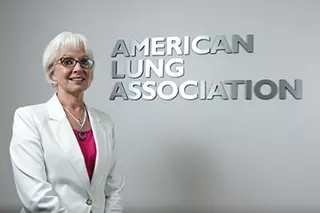BY ROBERTA CODEMO
The American Lung Association has a long history in Springfield dating back more than 30 years. Now, a new chapter is being written, with the Springfield office recently opening a second location to accommodate its growing needs.
The move comes at a time when the American Lung Association is undergoing internal changes. In July, the group’s national office and eight chartered associations united into a single nationwide organization to run more effectively and efficiently.
“It will give us the ability to leverage our resources and put more resources back into the community to deliver our mission,” said American Lung Association president and CEO Harold P. Wimmer, who has been with the organization since 1978.
Wimmer has spent much of his career in the Springfield office, and he still has a home here. He sees the local office as a key market for the grassroots organization.
“It makes economic sense,” he said, citing the talent and experience of the local workforce. “We can tap into a high level of medical expertise.”
The new Springfield office is located at 2501 Chatham Road. The move affects the environmental health group, development and advocacy staff. There are 13 staff members at the new location.
The existing financial division and call center will remain operational at 3000 Kelly Lane. The call center fields calls for the American Lung Association HelpLine and the Illinois Tobacco QuitLine, through which callers speak directly to registered nurses, respiratory therapists, certified tobacco treatment specialists and counselors. There is also a team of physicians on call.
Staff is beginning to settle in the new digs, says Angela Tin, vice president of environmental health.
“It was easier for us as a group to move,” said Tin, who coordinated the move. “Something had to be done. The building was getting crowded. We looked at several locations before this one was chosen. Everything fell together.”
Everyone works together to ensure the programs align with the mission of the organization, which is to save lives by improving lung health and preventing lung disease. The organization envisions a world free of lung disease.
A large part of the American Lung Association’s work focuses on air quality. Tin runs the environmental health group and leads projects which focus on reducing indoor and outdoor air pollution. She started working on a statewide indoor and outdoor air quality program in 2005. The program has since expanded throughout the Midwest.
Tin said the biggest concern of indoor air quality is radon, a radioactive gas which is the leading cause of lung cancer in non-smokers. She works with the Illinois Emergency Management Agency and local contractors to build healthy homes, works with homeowners regarding best home practices, and provides guidance on choosing building materials, flooring and environmentally-safe household products.
The leading threats to outdoor air quality are ozone, particulate matter and “aromatic compounds” from vehicle exhaust. The American Lung Association works to reduce emissions through new engine technologies and the use of alternative fuels like E85, biodiesel and electric vehicles.
“I’m excited about the opportunities that are out there,” Wimmer said.
Lung cancer is the number one cause of cancer deaths in this country and the number one killer among women, but advocates say there is not enough money for research. The organization is committed to providing patients and caregivers with support, and has also significantly increased funding for lung cancer research through fundraising.
One of the American Lung Association’s biggest fundraising events is the Fight for Air Climb, held each year at the Wyndham Springfield City Centre. It is the largest by population in the nation, and Kathy Drea, vice president of advocacy, says it is extremely successful for a city of this size. The organization also raises monies through its annual LUNG FORCE walk and golf outing.
At the local level, Drea lobbies the Illinois legislature to pass laws promoting lung health and preventing lung disease. The leading cause of lung cancer deaths is the use of tobacco products, and Illinois has one of the strongest smoke-free laws in the nation.
Drea was the force behind Smoke Free Springfield and is currently working to pass “Tobacco 21” legislation, which would raise the age to purchase tobacco products from 18 to 21.
“Ninety-five percent of smokers start before age 21,” she said.
To date, five states – California, Hawaii, Maine, Oregon and New Jersey – have passed such legislation. Last year, the measure passed the Illinois Senate but didn’t make it through the House. She did say that 10 municipalities in Illinois have passed ordinances banning the sale of tobacco products to those under 21.
When the American Lung Association was first founded lung cancer was nearly always fatal. That has changed over time, thanks to research efforts. Recently, the organization launched LUNG FORCE, which focuses on raising awareness about the dangers of lung cancer in women. In the last 40 years, the lung cancer death rate has risen 88 percent among women, according to the American Lung Association, yet awareness remains low, with lung cancer not being a top-of-mind health concern among 98 percent of women.
To help those at high risk for lung cancer, the organization recently launched a public service campaign called “Saved By The Scan” in partnership with the Ad Council. When lung cancer is diagnosed at an early stage, the survival rate is five times higher than when detected at a later stage. The campaign focuses on raising awareness about lung cancer screening and the benefits of early detection, and features an online lung cancer screening eligibility quiz at savedbythescan.org.
Much of this work is coordinated from Springfield, and Wimmer says it’s important to get the resulting information into the public to help save lives.









